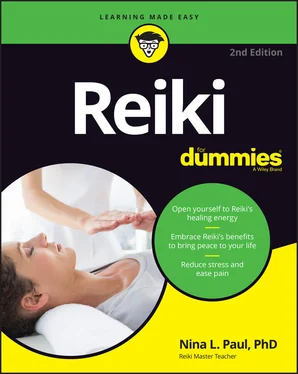 When you study Reiki, you’ll learn about and start practicing the Reiki Principles. It’s not enough to read the Reiki Principles and just turn the page. To get the full benefit and value of Reiki, aim to live by the Reiki Principles. Don’t worry — they express universal truths that any religion would approve.
When you study Reiki, you’ll learn about and start practicing the Reiki Principles. It’s not enough to read the Reiki Principles and just turn the page. To get the full benefit and value of Reiki, aim to live by the Reiki Principles. Don’t worry — they express universal truths that any religion would approve.
Describing the Reiki Principles
The Reiki Principles are so important and intrinsic to the practice of Reiki that they’re engraved on Mikao Usui’s tombstone. In the West, before Usui’s memorial stone was re-discovered and available in English, the Reiki Principles were taught in Western Reiki as instructed by Hawayo Takata. Once the Japanese translations were made, it brought more meaning and depth to working with the Reiki Principles.
 Don’t worry if you hear different forms of the Reiki Principles. Teachers from varying Reiki lineages (see Chapter 3) may present the principles in slightly different versions or translations (from the Japanese original). But the meaning of all versions is essentially the same. Use the version that your Reiki teacher provides (see Chapter 7) or a version that resonates with you the best.
Don’t worry if you hear different forms of the Reiki Principles. Teachers from varying Reiki lineages (see Chapter 3) may present the principles in slightly different versions or translations (from the Japanese original). But the meaning of all versions is essentially the same. Use the version that your Reiki teacher provides (see Chapter 7) or a version that resonates with you the best.
 The Reiki Principles can be broken down into simple statements describing how to live. The following are from the article “Reiki: Defining a Healing Practice for Nursing” by Kathie Lipinski and Jane Van de Velde, published in the journal Nursing Clinics of North America in December 2020. Just for today:
The Reiki Principles can be broken down into simple statements describing how to live. The following are from the article “Reiki: Defining a Healing Practice for Nursing” by Kathie Lipinski and Jane Van de Velde, published in the journal Nursing Clinics of North America in December 2020. Just for today:
Do not anger.
Do not worry.
Be grateful.
Do your work.
Be kind to others.
Staying in the present: Just for today
 An important part of the Reiki Principles precedes the five principles but applies to all of them: just for today.
An important part of the Reiki Principles precedes the five principles but applies to all of them: just for today.
Today is really all that matters. Yesterday is over, and tomorrow hasn’t happened. If your thoughts and energy are in the past or future, there’s little time left to experience the present. When you’re not fully focused on today, you may feel life is passing you by.
Filling too much time with reminiscing, looking at old photos, and wondering “what if?” is living in the past. Sitting with your daily planner and worrying about next year, next month, or even tomorrow is living in the future.
Staying in today is like balancing a seesaw. Spending too much time wandering in the past or in the future will distract you from today.
 Here are some tips to help you stay in the present moment:
Here are some tips to help you stay in the present moment:
Take note of your senses: Ask yourself what you see, feel, hear, smell, and taste.
Be with someone you love or an object of beauty like a sunset or a flower. Just focus on your love and merge with that.
Spend time with young children.
Try breathing exercises or meditation (see Chapter 9) to help focus on the present moment.
 Seeing the present moment as a gift (or a present ) makes every experience a joy to unwrap.
Seeing the present moment as a gift (or a present ) makes every experience a joy to unwrap.
When receiving or giving Reiki, being fully present also allows the Reiki energy to be at its brightest and highest intensity.
Going through the five Reiki Principles
In this section, I list the five Reiki Principles and offer you some ways to think about how to use these principles.
Everyone feels anger at one time or another. Triggers for anger occur when someone does you wrong, hurts your feelings, or challenges your security.
The goal of this Reiki Principle is to express your anger in a way that doesn’t hurt anyone (including you). Anger that isn’t properly channeled can lead to violence, war, crime, stress, and disease.
Anger that’s properly channeled can further your personal growth. The anger is a signal that you have an imbalance or conflict that needs to be addressed. (See the steps later in this section.) You can transform your anger by making changes in your thinking or actions.
 Not getting angry doesn’t mean pushing away your anger. Suppressed anger can come back to bite you and others. Anger that is submerged will arise again, perhaps even stronger and more destructive.
Not getting angry doesn’t mean pushing away your anger. Suppressed anger can come back to bite you and others. Anger that is submerged will arise again, perhaps even stronger and more destructive.
 Here are steps you can take to help you transform your anger:
Here are steps you can take to help you transform your anger:
1 See the anger.You can’t do anything about your anger if you don’t first recognize that you’re angry.
2 Take a timeout.Count to ten, breathe deeply, and think about the situation before reacting. Avoid knee-jerk reactions. Don’t send angry emails or shout angry words.If the anger dissipates on its own, let it go. If you still feel angry, you must go deeper to see what’s going on.
3 Decide what the anger means.Anger frequently masks other emotions, such as fear. For example, you might be angry with your husband for quitting his job because you fear being poor. Your fear about financial insecurity is what’s underneath the anger.Most people have some level of unresolved anger, trauma, loss, or other negative emotional state. Maybe you’re holding onto anger toward someone who harmed you in the past.Healing is a dedicated process of untangling, resolving, and releasing. The Reiki symbol Sei Hei Ki (see Chapter 8) can help with emotional healing. Be gentle with yourself and others; this is deep, sacred work.
4 Take action.Some action is clear-cut: If you fear financial insecurity, maybe you need to spend less, apply for a loan, or find ways to bring in more money. If someone in your life is making you angry on a regular basis, maybe you need to spend less time with that person.Other action is a remedy for actions not taken in the past, such as setting boundaries with behavior that’s not okay, revealing more of yourself to loved ones, or speaking your truth.
Feeling angry isn’t pleasant. Sometimes, you may be tempted to drown the anger in food, alcohol, or other addictive substances. You can’t run from the anger. Use it instead to lead you further in your spiritual journey. If you take the time to meditate on your anger, you’ll find a message intended for you. Your anger is actually a great teacher that can lead you to your truth.
 Learning to recognize and transform your anger from a knee-jerk reaction to calm action takes dedicated practice. You probably can’t change from being an angry person to being a calm one overnight. But you can follow the “just for today” idea to change your thinking and behavior. Slowly but surely, your anger will diminish.
Learning to recognize and transform your anger from a knee-jerk reaction to calm action takes dedicated practice. You probably can’t change from being an angry person to being a calm one overnight. But you can follow the “just for today” idea to change your thinking and behavior. Slowly but surely, your anger will diminish.
 If you find that you can’t resolve your anger or worry on your own, or if you’re having difficulty with traumatic memories, please find a therapist, counselor, or spiritual advisor who can help you.
If you find that you can’t resolve your anger or worry on your own, or if you’re having difficulty with traumatic memories, please find a therapist, counselor, or spiritual advisor who can help you.
Читать дальше

 When you study Reiki, you’ll learn about and start practicing the Reiki Principles. It’s not enough to read the Reiki Principles and just turn the page. To get the full benefit and value of Reiki, aim to live by the Reiki Principles. Don’t worry — they express universal truths that any religion would approve.
When you study Reiki, you’ll learn about and start practicing the Reiki Principles. It’s not enough to read the Reiki Principles and just turn the page. To get the full benefit and value of Reiki, aim to live by the Reiki Principles. Don’t worry — they express universal truths that any religion would approve. Here are some tips to help you stay in the present moment:
Here are some tips to help you stay in the present moment: Not getting angry doesn’t mean pushing away your anger. Suppressed anger can come back to bite you and others. Anger that is submerged will arise again, perhaps even stronger and more destructive.
Not getting angry doesn’t mean pushing away your anger. Suppressed anger can come back to bite you and others. Anger that is submerged will arise again, perhaps even stronger and more destructive.










